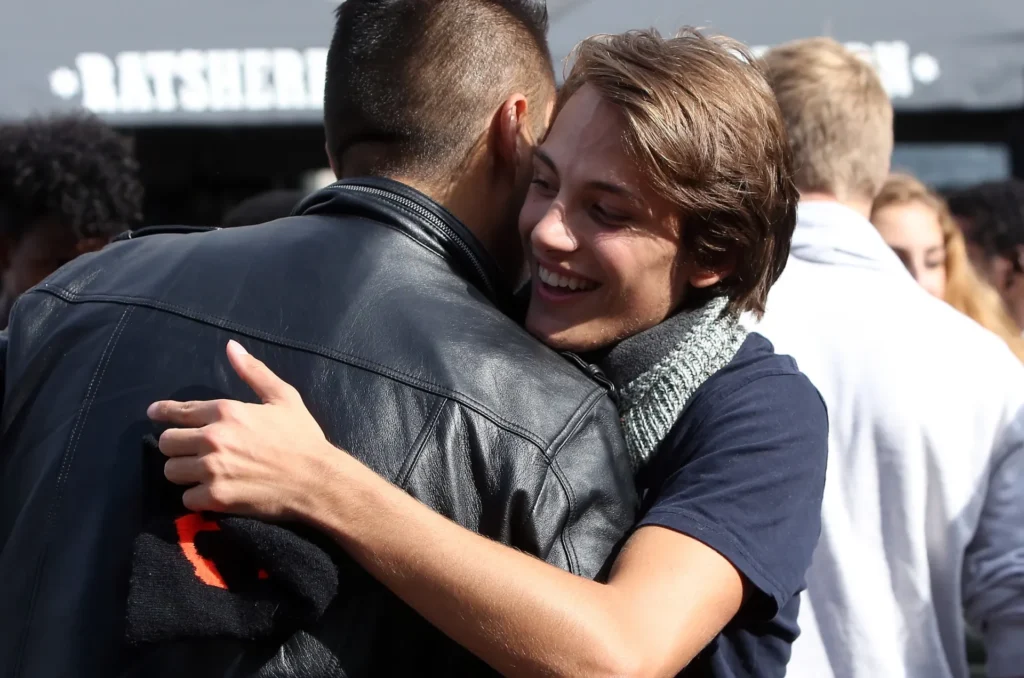
Friendship is an essential aspect of human connections, offering emotional support, companionship, and a feeling of belonging. Friendships between men have their own distinct qualities and dynamics that set them apart from other types of relationships. Exploring the intricacies, obstacles, and profound bonds that exist within male friendships reveals a profound understanding of their essence. This analysis focuses on the importance of male bonding and its impact on the lives of men, their emotional health, and their roles in society.
Exploring the Historical Context of Male Friendship

Throughout history, cultures have often celebrated and idealized the friendships between men. Throughout history, male friendships have been portrayed as noble and virtuous, drawing inspiration from the ancient Greek concept of “philia” and the warrior brotherhoods of the Vikings and samurai. The historical contexts highlight the significance of camaraderie, loyalty, and mutual respect in relationships among men. These friendships held immense importance, not just on a personal level, but also in shaping the social and military structures of the time.
Emotional Intimacy and Vulnerability

Emotional intimacy is a fundamental element of close friendships among men. Despite common assumptions, male friendships often involve strong emotional bonds. Men often discover a secure haven within their circle of friends where they can freely share their emotions, concerns, and aspirations without the worry of being criticized. This emotional vulnerability forms the foundation of trust and understanding, enabling individuals to provide support to one another during difficult times. For example, individuals may share their career goals, family concerns, or personal challenges with their friends, trusting that they will receive attentive support and valuable guidance.
Sharing Experiences and Activities

Shared experiences and activities are essential for building and sustaining friendships among men. Whether it’s playing sports, engaging in hobbies, or working on projects together, these activities foster a strong bond and a shared sense of accomplishment. These shared experiences frequently result in the formation of inside jokes, common interests, and a deep sense of loyalty. Take, for instance, a tight-knit circle of friends who have been teammates on a sports team for an extended period of time. They possess a treasure trove of collective memories and a profound comprehension of one another’s capabilities and vulnerabilities, both within and beyond the athletic arena.
Exploring Communication Styles in Male Friendships

The way men communicate in their friendships can often be quite different from how women communicate in their friendships. It is often observed that men prefer to convey their emotions through their actions and by engaging in shared activities, rather than relying on verbal expressions of affection. It should be noted that men still place importance on verbal communication, but they may tend to express their friendship in more subtle ways. For example, a person may demonstrate their care for a friend by assisting with their move to a new home or repairing their car, rather than relying solely on words of reassurance. Traditional gender roles and societal norms have a significant influence on this communication style.
Navigating Challenges in Male Friendships

Although male friendships can be deep and meaningful, they are not immune to challenges. It’s unfortunate that societal expectations and preconceived notions about what it means to be a man can sometimes make it difficult for men to develop and sustain meaningful friendships. The societal expectations placed on individuals can often hinder men from openly expressing their emotions, resulting in relationships that lack depth and authenticity. In addition, various life changes like getting married, becoming a parent, and advancing in one’s career can put a strain on friendships. This is because men may find themselves with less time to dedicate to nurturing these relationships. Tackling these challenges necessitates a deliberate focus on valuing friendships and reshaping societal expectations regarding men’s openness.
The Influence of Male Companionship on Psychological Well-being

Friendships between men can greatly influence mental health and emotional well-being. Having a strong circle of friends can be incredibly beneficial for individuals, offering them a support system to lean on during times of stress, anxiety, and depression. Research has indicated that individuals who maintain robust social connections tend to have lower rates of mental health problems and enjoy improved overall health. The support and understanding from friends can serve as a shield against the pressures of life, creating a feeling of stability and belonging. For example, a person experiencing a challenging divorce may discover comfort and resilience in the steadfast support of their friends.
Exploring the Development of Male Friendships

As men navigate through life, their friendships change as a result of their personal growth, various life experiences, and shifting societal expectations. During adolescence, guys tend to bond over common hobbies and pastimes, like sports or video games. As individuals progress into adulthood, relationships have the potential to grow stronger as they navigate through various life stages, including professional achievements, forming partnerships, and becoming parents. As men grow older, their friendships tend to acquire a more introspective nature, as they come to appreciate the enduring connections and shared experiences they have with their friends. Grasping this transformation aids in recognizing the lasting quality of friendships among men and their capacity to adjust to the twists and turns of life.
Exploring the Variances in Male Friendships Across Cultures

The cultural background of individuals has a profound impact on the way male friendships develop and evolve. In certain cultures, male friendships exhibit a greater degree of physical affection and emotional openness, whereas in other cultures, they tend to be more restrained and formal. For example, in Mediterranean and Latin American cultures, it is common for people to express affection through hugging and other physical gestures, which is considered a normal way for men to bond. On the other hand, friendships in certain Asian cultures tend to prioritize respect, loyalty, and a more reserved approach to showing emotions. Understanding these cultural differences is crucial for gaining insight into the various ways in which men across the globe perceive and appreciate friendship.
The Impact of Technology on Male Friendships

The rise of technology has had a profound effect on the way male friendships are established and sustained. Platforms like social media, messaging apps, and online gaming have opened up fresh opportunities for men to form connections and build friendships. These online platforms enable individuals to maintain connections regardless of their physical locations, exchange real-time experiences, and provide virtual support to one another. For example, a group of friends who live in different cities can still enjoy playing their favorite video games online, keeping their connection strong even when they’re physically apart. Although technology has undoubtedly made our lives more convenient and connected, it has also brought about certain challenges. One of these challenges is the possibility of having superficial interactions and the unfortunate decline of face-to-face communication.
The Evolution of Male Friendships

With the ever-changing landscape of society, it’s clear that the future of male friendships is looking bright. Men are being encouraged to form deeper, more meaningful connections as awareness of mental health issues and the importance of emotional well-being grows. Efforts to challenge conventional ideas of masculinity and encourage emotional vulnerability are also contributing to the development of a more nurturing atmosphere for male friendships. Efforts to promote open communication and mutual support among men are gaining momentum, fostering a societal change that recognizes the importance of emotional closeness in male friendships.
Final thought
The essence of male friendship is rooted in the profound emotional bonds, shared moments, and unwavering support that characterize these connections. Despite the various obstacles and changing circumstances that society presents, the bonds between male friends continue to play a crucial role in men’s lives, enhancing their emotional state and overall sense of contentment. By recognizing and embracing the distinct qualities of male friendships, we can cultivate a society that cherishes and supports these significant connections, guaranteeing that men can still experience the profound influence of genuine friendship.